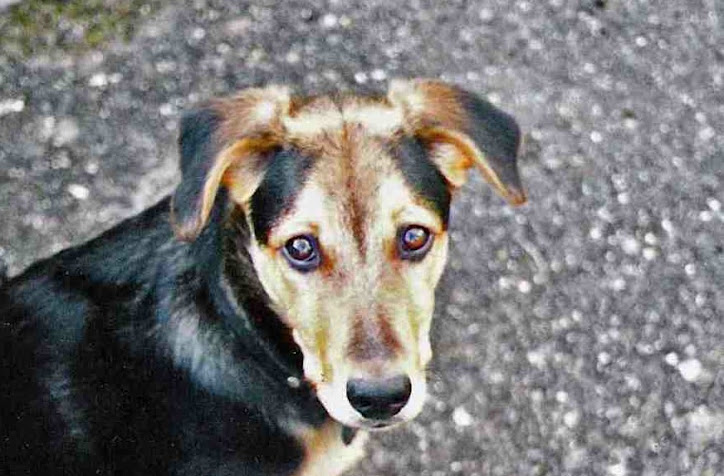
Who killed Rasher? by Ana Cristina Pereira
I hadn’t even left for Cape Verde before I heard about dog poisoning on Santa Maria's beaches. Meanwhile, Jacquie Cozens and Neal Clayton were mourning the loss of Rasher.
Neal was making a presentation about the conservation of marine turtles when, suddenly, Rasher jumped inside the hatchery. In just a few minutes Rasher started convulsing. Neal took him to a nearby hose and tried to make him vomit. The vet just simply said that it was death by poisoning with stricnine, a very toxic substance usually used to kill rats.
Rasher was born in Ireland. He lived in Sal since 2007. He was six years old and weighted 30 kilos. When I met Jacquie and Neal in a hotel in Santa Maria, they were still overwhelmed by the pain. To them, Rasher was like a child. How do you cope with the loss of a child?
They were not the only ones. On the day that Rasher died – the 8th of October - other people went through the same experience on the same beach. Rod Smith saw his dog, Cross, die and Jenny Quin and Vernon Archer saw their dog, Foxy, die.
That week the local newspaper Expresso das Ilhas printed a story about more than 15 dogs being killed in Santa Maria beaches. What the hell was happening in Sal? That was the question on Jacquie and Neal's lips. After that, people who came to Sal didn't even know this had happened.
All over the island visitors could see dogs running about and interacting with people - strays and other not-so-stray dogs. On the the beach I was approached by some of these dogs as soon as I opened my bag to take out the sandwiches.
I heard the story from Neal and imagined how horrific it must be to find dead stiff dogs instead of lively and friendly dogs. Jacquie went further and said: "So many children on the beach! Would a child survive if it ingested the poison that killed a 30kg dog?" I wanted more information.
The deaths occurred around the Hotel Riu Funaná and on the 9th of October Jacquie and Neal went to speak to the manager of this huge hotel thinking, "The hotel had to be responsible for their guests and staff, so they should investigate what happened and who was responsible and make sure that it didn't happen again". The conversation didn't go so well.
On the 14th, the couple was received by the local mayor, who assured them that the Câmara Municipal had nothing to do with this poisoning and that the health department was also investigating the matter. Two days later they received an extract of a letter that stated that a sanitary agent from the department of health had been contacted by the Riu Funaná hotel. However, it stated that this man had placed the poisoned on his own time.
Jacquie and Neal requested an explanation from the head office of the Riu chain and received a letter with an explanation that didn't convinced them: "In a recent past we had an increase of attacks of stray/wild dogs. (...) We informed the local authorities and we asked them to take care of the security of our customers and other people. (...) We are aware of any organized poisoning, nor do we accuse any institution of doing so".
When I met them, at the end of October, Jacquie and Neal had just given the case to the local prosecutor. They really want to find the culprits and bring them to justice.
Jacquie is a marine wildlife film-maker. In 2007 she came to Sal to make a film about the marine turtles and was horrified about the quantity of dead turtles on the beach and decided to found an NGO called SOS Tartarugas to protect them. Neal also embraced the cause.
"We brought Rasher here because he it wasn’t a long flight and it seemed like a good place for him to live". After what happened they no longer want to live there.
Individual stories can determine the impressions of one place. And my impression would be really bad if I had not heard one other story hadn't happened. One poor cat with no strength in his back legs survived thanks to the care of a guest and one employee of the Oasis hotel. A Portuguese lady saw a kitten and felt sorry for it and asked a member of the staff of the hotel to keep her and take care of it while she took care of the paperwork to bring her back to Portugal. She had just flown back to come and get it. The cat "Oasis", can almost walk now.
The original can be viewed here
http://jornal.publico.clix.pt/Suplementos/Fugas/
 her. I had planned to take Rasher and his harem to Surf Beach as I had a nest to excavate there, but going to the main hatchery at the RIU hotel was a rare treat for Rasher and was only possible since we had bought the Landrover. I was about to shout out and tell Neal to leave him with me but didn't. That decision will haunt me for the rest of my life.
her. I had planned to take Rasher and his harem to Surf Beach as I had a nest to excavate there, but going to the main hatchery at the RIU hotel was a rare treat for Rasher and was only possible since we had bought the Landrover. I was about to shout out and tell Neal to leave him with me but didn't. That decision will haunt me for the rest of my life.




